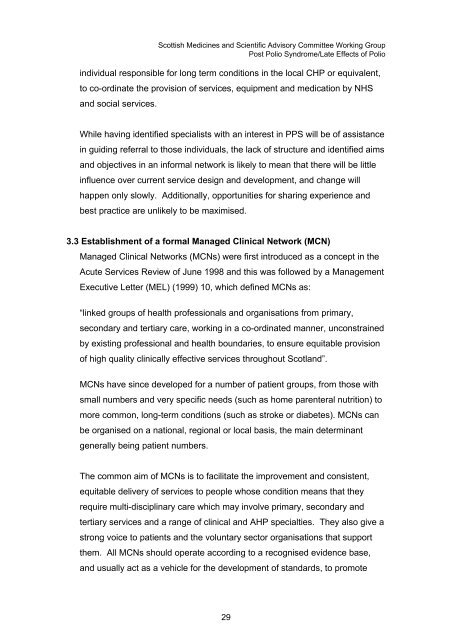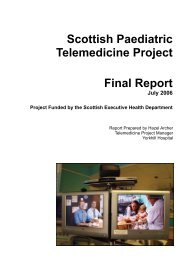SMASAC Working Group Post Polio Syndrome - Scottish Health On ...
SMASAC Working Group Post Polio Syndrome - Scottish Health On ...
SMASAC Working Group Post Polio Syndrome - Scottish Health On ...
Create successful ePaper yourself
Turn your PDF publications into a flip-book with our unique Google optimized e-Paper software.
<strong>Scottish</strong> Medicines and Scientific Advisory Committee <strong>Working</strong> <strong>Group</strong><br />
<strong>Post</strong> <strong>Polio</strong> <strong>Syndrome</strong>/Late Effects of <strong>Polio</strong><br />
individual responsible for long term conditions in the local CHP or equivalent,<br />
to co-ordinate the provision of services, equipment and medication by NHS<br />
and social services.<br />
While having identified specialists with an interest in PPS will be of assistance<br />
in guiding referral to those individuals, the lack of structure and identified aims<br />
and objectives in an informal network is likely to mean that there will be little<br />
influence over current service design and development, and change will<br />
happen only slowly. Additionally, opportunities for sharing experience and<br />
best practice are unlikely to be maximised.<br />
3.3 Establishment of a formal Managed Clinical Network (MCN)<br />
Managed Clinical Networks (MCNs) were first introduced as a concept in the<br />
Acute Services Review of June 1998 and this was followed by a Management<br />
Executive Letter (MEL) (1999) 10, which defined MCNs as:<br />
“linked groups of health professionals and organisations from primary,<br />
secondary and tertiary care, working in a co-ordinated manner, unconstrained<br />
by existing professional and health boundaries, to ensure equitable provision<br />
of high quality clinically effective services throughout Scotland”.<br />
MCNs have since developed for a number of patient groups, from those with<br />
small numbers and very specific needs (such as home parenteral nutrition) to<br />
more common, long-term conditions (such as stroke or diabetes). MCNs can<br />
be organised on a national, regional or local basis, the main determinant<br />
generally being patient numbers.<br />
The common aim of MCNs is to facilitate the improvement and consistent,<br />
equitable delivery of services to people whose condition means that they<br />
require multi-disciplinary care which may involve primary, secondary and<br />
tertiary services and a range of clinical and AHP specialties. They also give a<br />
strong voice to patients and the voluntary sector organisations that support<br />
them. All MCNs should operate according to a recognised evidence base,<br />
and usually act as a vehicle for the development of standards, to promote<br />
29



